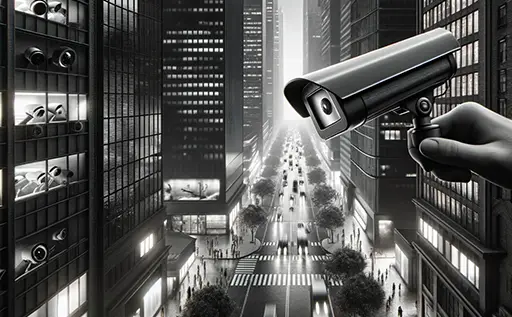– Eyes Everywhere: Explore how public surveillance has grown exponentially in urban areas.
– Implications for Privacy: Understand the impact of widespread surveillance on personal privacy.
– Tools for Protection: Learn how using incognito browsing mode in the Incognito Browser can protect your online privacy amidst increased surveillance.
– Technologies at Play: Delve into the sophisticated technologies that power modern surveillance systems.
– The Debate: Public Safety vs. Privacy – Unpack the ongoing debate and where we draw the line.
– Staying Secure: Discover additional steps you can take to maintain your privacy in a heavily monitored city.
As our cities grow smarter, they are also becoming significantly more surveilled. From expanding networks of CCTV cameras to sophisticated facial recognition software, urban areas are witnessing an unprecedented rise in public surveillance.
While these technologies aim to enhance security and streamline city management, they also raise critical questions about privacy. How do we navigate this new reality where almost every public step we take is monitored? In this digital age, tools like the Incognito Browser with its robust incognito mode offer powerful ways to reclaim our privacy.
Eyes Everywhere: The Expansion of Public Surveillance
Surveillance infrastructure is becoming an integral part of modern cities. CCTV cameras, once limited to specific high-risk areas like banks and intersections, now blanket entire neighborhoods.
Smart streetlights equipped with cameras, license plate readers, and even audio sensors mean that nearly every corner is under watch. Add to that the rise of private surveillance systems—doorbell cameras, drones, and commercial security setups—and it becomes clear that our movements are tracked more than ever before.
Implications for Personal Privacy
With continuous surveillance, a crucial question arises: what does this mean for our individual privacy? Data captured through these extensive networks don’t just include images but can also extend to audio recording and advanced biometrics like facial recognition.
While touted as tools for enhancing public safety, these technologies have profound implications for personal freedom and autonomy. How much of our behavior is altered simply because we know we’re being watched?
Public Safety vs. Privacy: The Great Debate
The debate between maintaining public safety and preserving privacy is complex. Proponents argue that increased surveillance helps deter crime and can expedite law enforcement efforts, making cities safer. However, critics caution against the potential abuse of such systems, pointing out how easily they could be employed for mass surveillance without proper oversight. Balancing these competing interests is a contentious issue that society grapples with as surveillance technology continues to evolve.
Technologies Behind Modern Surveillance
Understanding the technological landscape helps elucidate why modern surveillance is so pervasive:
Facial Recognition: This technology can identify individuals in a crowd within seconds, linking faces to extensive databases containing personal information.
License Plate Readers: These devices capture and record license plates en masse, tracking vehicle movements across cities.
Smart Sensors: From streetlights equipped with cameras to audio sensors that detect gunshots, smart sensors are ubiquitous.
Drones: Providing aerial views of large areas, drones add another layer of complexity to urban surveillance.
The rapid evolution of these technologies makes it increasingly challenging to maintain any semblance of anonymity in public spaces.
Tools for Protecting Online Privacy
While many aspects of public surveillance seem beyond individual control, there are ways to protect oneself online. Using incognito browsing mode on apps like the Incognito Browser offers significant advantages over standard browsing modes offered by big tech firms:
Ad Blocker: An ad blocker not only curbs annoying ads but effectively limits pathways advertisers use to track online behavior—vital in a heavily monitored environment.
Browse Web3: Accessing decentralized applications keeps interactions private by design, sidestepping centralized points vulnerable to surveillance.
Agent Cloaking: This feature takes incognito mode private browsing to another level by masking your digital fingerprint, making it harder for websites to track you.
Anti-Tracking and Anti-Fingerprinting Technology: These advanced features prevent websites from gathering and storing detailed profiles about your online activities, offering robust privacy protections.
Maintaining Anonymity in Monitored Cities
The reality of pervasive urban surveillance demands that we take extra steps to preserve our privacy:
Awareness and Behavior: Being aware of when and where you’re likely being monitored can help you make more informed decisions about your actions and communications.
Encryption Tools: Encrypting your communications—whether emails or chats—adds an essential layer of security against prying eyes.
Why Incognito Mode on Incognito Browser?
In a world where public-facing surveillance networks might soon be able to peer directly into our digital lives, using incognito mode private browsing on the Incognito Browser ensures your online privacy remains intact. Regular incognito modes fall short compared to the comprehensive protections offered by the Incognito Browser.
Features like agent cloaking and anti-tracking technology provide needed reassurance in a monitored environment. Ensuring uninterrupted browsing without intrusion, it also boasts fast multi-threaded downloads, blocking unwanted ads automatically.
As urban environments transform under the watchful eye of widespread surveillance technologies, protecting one’s privacy becomes both more challenging and more critical.
The balance between enhancing public safety and preserving personal freedom is delicate and fraught with ethical considerations. For those concerned about their digital footprint amidst this evolving landscape, utilizing advanced tools like the Incognito Browser’s incognito browsing mode offers a vital line of defense.
By embracing cutting-edge privacy solutions and remaining vigilant about how we manage our data, we can navigate the complexities of living in highly surveilled cities while still safeguarding our autonomy.
The importance of privacy tools cannot be overstated—today’s incognito browsers have come far from mere private windows to encapsulate robust features promising genuine security. With constant development in surveillance technology against us, keeping our defenses equally adaptive remains paramount.
Equip yourself with knowledge, stay informed about technologies that protect you online, and make conscious choices—the road ahead requires nothing less if we aim to uphold both safety and freedom amidst ever-watching eyes of modern cities.



